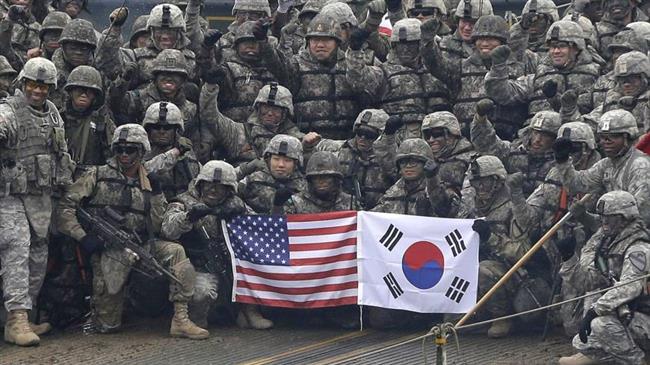
US and South Korean army soldiers pose on a floating bridge on the Hantan River during a joint military exercise in Yeoncheon, South Korea, in December 2015. (Photo by AP)
This year’s U.S.-ROK annual joint military drills kicked off on 1 April after a delay of two months caused by the astonishingly fast-forwarded bilateral thaws between the Koreas, U.S. and China. The first part of the drills, Foal Eagle, will involve a field training exercise of 11,500 U.S. and 290,000 ROK troops and the remaining part, Key Resolve, will involve a computer-based-simulation exercise of 12,200 U.S. and 10,000 ROK troops. Although both U.S. and ROK military press releases announced that the intensity of the drills will be similar to that of last year, the drills are expected to be low-key, cautiously reflecting the thaws. The duration of Foal Eagle has been shortened from two months to one, and Key Resolve from one month to two weeks. Plans for U.S. strategic asset deployment have also been altered as the deployment of large-scale nuclear-powered aircraft carriers and submarines has been cancelled. Allegedly, however, such cancellation is offset by the deployment of other assets, including those crucial to the operation of ‘Decapitation Strike’, such as MC-130, as well as those that support marine landing in case of full-scale war, such as the amphibious assault ship group USS Wasp.
Contrary to last year, when he vociferously starred as President Trump’s evil counterpart, Kim Jong-un has remained silent since he expressed that he ‘understands South Korea’s stance’ on the drills during his meeting with President Moon’s convoys on 5 March. Once called ‘Crazy Fat Kid’, Kim Jong-un now appears on TV like any other ordinary global leader with complete disregard for the public’s willingness to accept such anomaly. The bizarre images of him awkwardly shaking hands with Chinese President Xi Jinping and IOC President Thomas Bach credit this fashion terrorist with the egregious hairstyle with rational characteristics and the capacity to run a ‘normal state’. Kim Jong-un’s gawky debut in the global diplomacy theater prior to the end of April meeting with South Korean President Moon Jae-in, followed by the May meeting with President Trump, are, nonetheless, carefully planned attempts to play soft-powered preliminary warm-up.
Many experts agree that Kim Jong-un’s recent pro-diplomacy moves reveal his disguised intent to strengthen negotiation leverage for the May meeting. It is predicted that Kim Jong-un will ultimately demand the withdrawal of U.S. forces and strategic assets from the Korean peninsula through the orderly steps of earning recognition as a normal state, signing the peace treaty with the U.S., restoring diplomatic relations with the U.S., and damaging the U.S.-ROK alliance throughout the process. Backward induction of these future strategic aims, in conjunction with Kim Jong-un’s common ground interests with China and Russia’s emphasis on ‘double-freeze’, also explains the reclusive leader’s real intent, well-observable in his first foreign trip to China. China, vexed with its dwindling influence on the Korean peninsula since the startling U.S.-DPRK thaw, warmheartedly welcomed Kim Jong-un’s visit, which restored China’s seven-year decoupled diplomatic relations with North Korea. In response, Kim Jong-un shared with President Xi his refusal to accept the Libyan denuclearization model and alternatively proposed a procedural, step-by-step model to maximize his stakes. Kim Jong-un’s seemingly desperate yet innately strategic outreach now engages China in potentially alleviating sanctions and enlarging the pie on the negotiation table of the soon-to-be held six-party talks. Such guileful outreach will extend to other stakeholders as well. A number of experts anticipate that Kim Jong-un will soon meet with Russian President Putin to discuss the May meeting.
Can South Korea Save Itself?
The South Korean Moon administration’s subtle predilection for temporary peace over Complete, Verifiable, and Irreversible Denuclearization (CVID) calls into question whether recent temporary thaws can truly evolve into perpetual peace, given the fact that South Korea cannot defend itself (but such a leftist position is sympathetically understandable considering the doomsday nature of the war with Kim Jong-un). For some Korean conservatives, the emotional aspect of the currently deepening inter-Korean rapprochement seems to blind the Korean people into realizing the realpolitik beneath the thaws, a situation reminiscent of the geopolitical conditions that led to Nixon’s pursuit of Vietnamization during the U.S.-China détente era. Unless South Korea in the divided Korean peninsula has credible capacity to defend itself, the risks involving the incremental approach toward reunification should always be managed with a keen, vigilant reciprocity-oriented mentality.
The Kim dynasty has always taken advantage of the uncertainties arising from frequent regime changes in competitive democracy between the U.S. and South Korea, while the U.S.-ROK alliance has ironically suffered from the certainty shown in the Kim dynasty’s consistent policy pursuit of WMD development. Rewarding the Kim dynasty for its temporary for-aid deception under such uncertainties has always generated more next-level costs than benefits, while the Kim dynasty has repeatedly breached the Agreed Framework by non-compliance. Thus, the Kim dynasty’s abominable past records of repeatedly withdrawing from the NPT (Nuclear Non-Proliferation Treaty) and KEDO (Korean Peninsula Energy Development Organization)’s failures to certify the Kim dynasty’s commitment to ‘freeze’ plutonium production and programs all lead to one very clear conclusion. Even if the Moon administration’s goal of denuclearizing the Korean peninsula is a procedurally long-term one and the leftist regime does not seek a regime change in North Korea, such aims must reciprocally maximize its negotiation leverage by strategically devising a step-by-step blueprint for consistently punishing and sanctioning Kim Jong-un whenever he displays detracting behaviors.